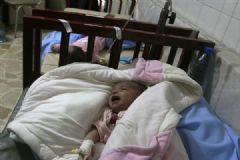Share
Human Rights Voices
While the UN devotes its human rights operations to the demonization of the democratic state of Israel above all others and condemns the United States more often than the vast majority of non-democracies around the world, the voices of real victims around the world must be heard.
Syrian Arab Republic, August 4, 2016
6 Hospitals Bombed Around Aleppo, Syria, in 1 Week: Rights Group
Original source
Syrian government forces launched airstrikes against six hospitals in the Aleppo area within a week, a U.S.-based rights group said Wednesday.
Physicians for Human Rights (PHR) said it was the worst week for attacks on medical facilities in the Aleppo region since the beginning of Syria's five-year conflict, which has killed more than 250,000 people.
The medical facilities were hit between July 23 and 31, the group said.
The city and province of Aleppo have been among the areas hardest hit by intensifying violence as peace efforts earlier this year failed and a fragile cease-fire crumbled.
"Since June, we've seen increasing reports of attacks on civilians in Aleppo and strikes on the region's remaining medical infrastructure," PHR's director of programs Widney Brown said in a statement. "Each of these assaults constitutes a war crime."
Government forces and their allies, with Russian backing, have advanced in recent months and imposed a siege on the rebel-held sector of Aleppo since early July, when they closed the main road from opposition areas out of the city.
"The bombings, the lack of humanitarian aid and the failure of the United Nations to deliver any kind of assistance means the death toll may soon be catastrophic," Brown said.
PHR said it has documented more than 370 attacks on 265 medical facilities during the five-year conflict, as well as the deaths of 750 medical personnel.
Meanwhile, the United Nations Children's Fund said it is "extremely" concerned for the safety and well-being of children caught up in the violence engulfing Aleppo.
UNICEF's regional director Saad Houry called for unhindered humanitarian access to the divided city and for children to be protected. UNICEF said that children make up a third of the 300,000 residents trapped in rebel-held besieged neighborhoods.
In the western, government-controlled areas, UNICEF said 25,000 people have been displaced and are taking shelter from intense fighting in mosques, university campuses and public gardens.

